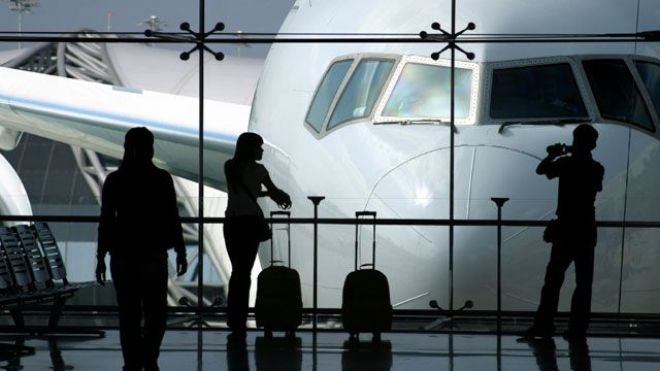Most travelers survive in-flight medical emergencies, study shows
Is there a doctor on board? Surprisingly often, there is - in half of in-flight medical emergencies - and sick airline passengers almost always survive, a new study finds. The research is the largest look yet at what happens to people who develop a medical problem on a commercial flight - about 44,000 of the 2.75 billion passengers worldwide each year, researchers estimate. Most cases don't require diverting a plane as the study's leader, Dr. Christian Martin-Gill, advised a pilot to do two years. He works for MD-STAT, a service at the University of Pittsburgh Medical Center that advises about 20 major airlines on how to handle in-flight emergencies. Another large service is based in Phoenix. Martin-Gill handled a call when a passenger seemed to be having a heart attack on a flight from Europe to the U.S. The man's implanted defibrillator had shocked his heart five times to try to restore normal rhythm. “The aircraft was in the middle of its destination, flying over the Atlantic,” so he recommended landing at Newfoundland off the Canadian coast to get the man to the nearest hospital, Martin-Gill said. The federally funded study reviewed about 12,000 cases handled by the Pittsburgh center over nearly three years. Results are in Thursday's New England Journal of Medicine. Researchers found: -The odds of a medical emergency are 1 per 604 flights, or 16 per 1 million passengers. -Planes had to be diverted for emergency help in only 7 percent of cases. -Doctors were on board and volunteered to help in 48 percent of cases; nurses and other health workers were available in another 28 percent. Only one-third of cases had to be handled by flight attendants alone. -The most common problems: Dizziness or passing out (37 percent of cases); trouble breathing (12 percent) and nausea or vomiting (10 percent). -About one-fourth of passengers were evaluated at a hospital after landing and 9 percent were admitted, usually with stroke, respiratory or cardiac symptoms. -Out of nearly 12,000 cases, a defibrillator was applied 137 times, including in 24 cases of cardiac arrest, where the heart had stopped. (Sometimes defibrillators are used to analyze an irregular heart rhythm to help doctors figure out what to do, not necessarily to deliver a shock.) -Of the cases in this study, only 36 deaths occurred, 30 of them during the flight and the others after landing. -Pregnancy-related problems were generally rare - 61 cases, in this study - and two-thirds of them involved women less than 24 weeks along with possible miscarriages. Air travel is considered safe up to the 36th week, or the last month, of pregnancy. Only three cases of women in labor beyond 24 weeks of pregnancy led to a plane being diverted. Dr. Lisa Rosenbaum, a University of Pennsylvania cardiologist, helped in a case like that in 2007, on a flight from Boston to Portland, Ore. The passenger was three months from her due date but was having contractions every minute - something that can often be stopped with drugs and treatment at a hospital but not in midair. “It was clear to me that labor was imminent and that we needed to land the plane,” so, on her advice, the pilot diverted to upstate New York, Rosenbaum said. “It was one of the scariest experiences of my life. It's not like taking care of a patient in the hospital.” Dr. David Rogers, a pediatric surgeon at the University of Alabama at Birmingham School of Medicine, felt that fear five years ago when an elderly woman had trouble breathing during a flight to Atlanta from Toledo, Ohio. Being a specialist at treating children rather than adults, “my first reaction was to look around and hope there would be somebody else” more qualified to help, he said. Luckily, a flight attendant had already given the woman an oxygen mask and she seemed to be improving, so he felt the plane could continue to Atlanta, the woman's home. Trying to determine whether to divert a plane was a tough call, he said. “I'm making a decision that's going to affect a plane full of people,” not just the patient, Rogers said. Some passengers may fear liability if they help in such situations, but a Good Samaritan law protects those who do so, the study notes. And although health workers are not legally obliged to help, they have a moral obligation to do so, the authors write. And you never know what kind of help will be requested. Martin-Gill said a partner once was consulted when a dog suffered a cardiac arrest during a flight. He didn't know how things turned out.source : http://www.foxnews.com/health/2013/05/30/most-travelers-survive-in-flight-medical-emergencies-study-shows/
